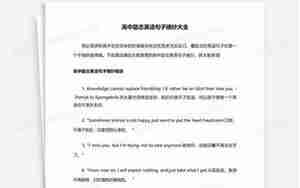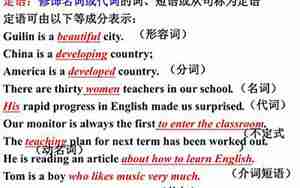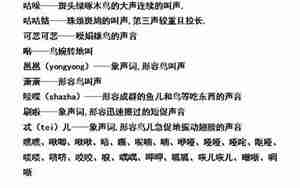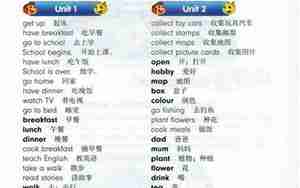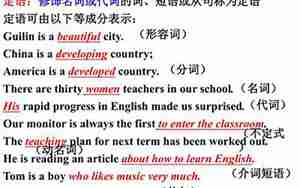
《英语学习:从简单句到理解的桥梁》
在当今全球化的世界中,掌握基本的英语沟通能力已经成为一种必要技能。无论是日常交流,还是业务拓展,简单的英语句子都能发挥出惊人的效力。对于中老年读者来说,这并不意味着必须成为语言学家,而是要学会如何运用这些简洁的语句来拉近与世界的距离。今天,我们将深入探讨如何理解和运用那些日常生活中常见的简单英语句子。
了解英语的基础构建块至关重要。比如,"Hello, how are you?"这个句子,直译为"你好,你怎么样?",这是最常见的初次见面问候语。它体现了英语句子的基本结构:主语+谓语+问候语。记住这种简单的句型,你就能轻松地开始交流。
掌握常用短语和表达能让你的信息传达更准确。例如,"I'd love to try that",这句话表示"我很想试试",在日常邀请中十分实用。短语如"Thank you so much"和"Can you help me, please?",则能让你在礼貌中展现出自信。
再者,了解英语的时态和语态也是关键。像"Yesterday, I went to the park"(昨天,我去了公园),这里的"Yesterday"表明了句子的过去时态。一个句子的时态能清晰地传达出事件的时间线索,这对于理解别人的故事或讲述自己的经历至关重要。
此外,重复和实践是学习任何语言的基础。你可以通过阅读简单的儿童书籍、观看英语电影或使用翻译应用辅助,逐渐增加对简单句子的熟悉度。例如,使用一款名为Duolingo的语言学习应用,每天只需花费几分钟时间,就能让你的英语水平有所提升。
总结来说,理解并学会运用简单的英语句子,能使你的生活更加丰富多彩。无需畏惧复杂的语法,关键在于持续的实践和运用。在这个过程中,你会发现,尽管起初可能觉得难以适应,但随着日积月累,简单的英语句子将成为你通往全球沟通的大门。所以,让我们从现在开始,一步步走进英语的世界吧!
In the globalized world we live in today, knowing basic English communication skills is a valuable asset. For the elderly, it's not about becoming a language expert, but mastering simple English phrases that can bridge the gap in daily interactions. Let's delve into the essentials of understanding and employing everyday simple sentences.
To start, grasp the building blocks of the language. An example like "Hello, how are you?" shows the basic structure: subject + verb + question. Remembering these patterns is the foundation for clear communication. For instance, knowing "I'd love to try that" means "I'm really interested" comes in handy for invitations.
Next, familiarize yourself with common short phrases and expressions, such as "Thank you so much" and "Can you help me, please?", which enhance your ability to convey precisely. Mastering time frames, like "Yesterday, I went to the park" with its past tense, aids in understanding narratives.
Don't forget, repetition and practice are crucial. Reading children's books, watching English movies, or using apps like Duolingo can help you gradually build your knowledge of simple sentences, even in short daily increments.
In conclusion, understanding and using simple English sentences opens a world of possibilities. While initially daunting, adopting this skill with consistent effort will lead to more effective communication. Embrace the journey and allow these simple phrases to unlock a global connection for you. So, take that first step today, and you'll find English becoming more than just a language, but a tool for enriching your life.
简单的句子英语翻译
英语中的简单句:清晰与力量的源泉
在日常生活中,英语中的简单句子可能看起来微不足道,但对于任何人来说,无论年龄大小,它们都承载着巨大的实用价值。简单句不仅是学习英语的起点,也是有效交流的基础。那么,让我们一起探索如何理解和运用这些易于掌握的英语构造。
例如,"I eat breakfast at 7 o'clock",这句话直译为"我七点钟吃早餐"。它展示了英语中常见的主谓结构,这种句子在描述日常习惯或时间安排时十分清晰。记住这种结构,你就能轻松用英语讲述你的日常生活。
短小的祈使句,如"Please close the door"(请关门),在家中、工作中或旅行中都显得十分实用。它们能让你的请求简洁明了,增加沟通效率。
理解基本的时态,如现在时(如"I work at a library"),过去时(如"I studied English last night"),和未来时(如"I will meet you tomorrow"), 能帮助你更好地表达时间性的事件,有效地参与到日常对话中。
别忘了,实际的运用是学习的关键。尝试阅读简单的儿童故事,观看英语动画,或者与孩子保持日常的英语对话,都是练习这些简单句子的好方法。比如,Google的简单英语翻译工具,可以让你在第一时间理解并模仿这些句子。
总结来说,简单英语句子犹如英语世界的基石,它们虽易于理解,但蕴含着丰富的表达力。无论是日常对话,还是提升语言能力,掌握这些基础的句型都是必不可少的。所以,让我们从简单的开始,踏上英语学习的旅程吧!
In the hustle and bustle of daily life, simple English sentences may seem insignificant, but they hold immense utility for all. Simple sentences serve as the foundation for effective communication, especially for those seeking to learn English. Let's examine how to grasp and utilize these straightforward language constructs.
Consider "I eat breakfast at 7 o'clock" - this illustrates the common subject-verb structure used to describe routines or general time events. Mastering this pattern allows you to convey your day-to-day activities with ease.
Short commands, such as "Please close the door", are powerful in conveying clear requests in various situations. They streamline communication by keeping it direct.
Understanding the basics of time, like present tense (like "I work at a library"), past tense (like "I studied English last night"), and future tense (like "I will meet you tomorrow"), enables you to narrate events with precision.
To reinforce your learning, engaging with materials like children's books, watching English content, and incorporating conversations, even with simple phrases, can greatly enhance your fluency. For example, using Google Translate can be a practical tool to translate and learn from these sentences.
In conclusion, the power of simple English sentences lies in their simplicity and effectiveness. Embrace them as stepping stones on your language learning journey. Remember, every simple phrase puts you one step closer to smooth and confident communication.
简单的英文短句带翻译
英语短句入门:简练沟通的魔法钥匙
无论你在学习英语的初级阶段,还是希望在生活中增添一点便利,掌握简单的英文短句都是至关重要的。这些短小却力量十足的句子,如同日常交际中的魔力钥匙,能够帮你迅速表达观点和理解他人。下面是我们将要探讨的一些常见的英文短句及其翻译:
1. "Hello, how are you?"(你好,你怎么样?) — 这是见面打招呼的标准用语,用于询问朋友和熟人的近况。
2. "I'm sorry, I don't understand."(对不起,我不明白。) - 在遇到不明白的情况时,这个短句能表明你的需要,也显示你的礼貌。
3. "Please pass me the salt."(请递给我盐。) — 请求或指示他人做某事时,这样的简单句子便于交流。
4. "Thank you very much."(非常感谢。) — 在接受帮助或服务后表达赞赏,这是一种基本的礼貌。
5. "Could you repeat that, please?"(你能再说一遍吗?) - 当你没听清或需要确认时,这个句子派上用场。
6. "I love reading books."(我喜欢读书。) — 想分享你的兴趣爱好时,简单的陈述句可以清晰表达。
7. "Have a nice day!"(祝你有个美好的一天!) — 这是一个友善的告别语,也能让他人在一天结束时感到愉快。
记住,理解并熟练运用这些短句,能让你在各种情境中更加自信。通过不断的实践和日常对话,这些短句会逐渐融入你的英语表达中。例如,使用语言学习应用如Duolingo,你可以轻松地重复这些短句,从而增强记忆。
总结来说,简单的英文短句是交流的基石,它们虽然短暂,却富含深意。掌握并熟练使用它们,将使你在英语世界中自在流畅。现在,就开始你的英语短句之旅吧!
Whether you're a beginner or seeking to simplify your interactions, mastering simple English phrases is a key to effective communication. From everyday greetings to clear requests, these concise statements pack a punch. Let's explore some common, everyday English snippets with their translations:
"Hello, how are you?" (用于问候与询问近况)
"I'm sorry, I don't understand." (表明需要帮助或理解)
"Please pass me the salt." (请求他人协助)
"Thank you very much." (表达感激)
"Could you repeat that, please?" (请求重述)
"I love reading books." (分享兴趣)
"Have a nice day!" (祝愿他人)
Remember, with practice and use, these phrases will become a natural part of your English toolkit. Apps like Duolingo can assist you in repeating these phrases to build fluency. So, harness the power of these simple sentences to enhance your English conversations and enjoy the ease of communication they bring. The journey starts here.
很简单的英文句子
简洁英语:日常生活中的沟通小工具
在日常生活中,一些简单的英文句子如同日常生活中的小工具,简洁明了,却能有效地表达你的想法和需求。以下是一些常见的简单英文句子,让你在与人交流时更加自如:
1.— 你好!这是最基本的问候语,无论何时何地,都能拉近你与他人的距离。
2. Good morning./Good afternoon./Good evening。* — 早上好/下午好/晚上好。用来问候朋友、家人或同事。
3. I need help, please。* — 我需要帮助。当你需要协助时,用这句简洁的话语表明需求。
4. Can you speak slowly? — 你能说得慢一点吗?在学习或理解上有困难时,这样说会很有帮助。
5. Yes, please。* — 是的,请。用于接受提议或服务,如点餐或确认某事。
6. No, thank you。* — 不,谢谢。拒绝时,保持礼貌且简洁。
7. Excuse me, where is...? — 对不起,请问…在哪里?迷路或者寻求方向时,这样问既礼貌又直接。
8. I'm sorry, I don't know。* — 对不起,我不知道。当无法提供信息时,诚实表达。
记住,多实践这些句子,通过重复和日常对话来增强记忆。例如,你可以使用语言学习应用 like "Hi Hay",这些应用中的简单对话模式能帮助你巩固这些基础句子。
总结来说,简单英文句子是日常沟通的基石,它们虽短小,却能大大提升你的交流效率。开始关注这些日常用语,并在日常生活中自然地运用它,你会发现英语不再那么遥远,而是融入生活的日常之物。
In the hustle of everyday life, simple English sentences serve as essential communication tools. Here are some basic phrases that you can use effortlessly to express yourself:
— A simple greeting to initiate a conversation.
Good [morning/afternoon/evening] — Greetings for different parts of the day.
I need help, please。* — Express your need for assistance when needed.
Can you speak slowly? — Request for slower pace if you're struggling to understand.
Yes, please。* — Acceptance for an offer or service.
No, thank you。* — Decline politely.
Excuse me, where is...? — Asks for directions with politeness.
I'm sorry, I don't know。* — Be honest and transparent when你知道答案。
To become proficient, practice these phrases repeatedly and incorporate them into daily interactions. Apps like "Hi Hay" can assist in your learning by providing conversational contexts. Remember, incorporating these simple sentences into your life will make English a natural part of your communication.
简单英语句子翻译百度文库
简单英语句子翻译:让你的交流无障碍
深入到英语学习的门槛,你会发现,即使是简单的句子,也能展现其强大的沟通力。在百度文库或任何资源库中,你可能会找到大量的实用短句翻译,例如:
"I'm fine, thank you." (我很好,谢谢。) 这是回答他人询问身体状况的一个典型例子。
"Where is the nearest restroom?" (最近的洗手间在哪里?) — 出门在外,询问实用信息的句型。
"Can you help me with my luggage?" (你能帮我拿行李吗?) — 旅行时的实用请求。
这些句子虽短,但涵盖了常见的日常对话场景,帮助你跨越语言障碍。学习时,不妨关注它们的句型结构,比如主+谓+宾的结构("I am" + "fine"),或者用疑问词引导的询问("Where" + "is" + "the" + "nearest" + "restroom")。
记住,成功的关键在于不断重复和实践。你可以尝试模拟对话,或者在实际场景中使用这些句子,以提高理解能力和表达能力。使用语言学习工具,如Google翻译或Duolingo,这些工具能提供即时的翻译和练习。
总结来说,简单英语句子翻译是语言学习的基础,它们让你能够与世界更直接地交流。通过学习并熟练运用这些短句,你将能更自信地在日常生活中应用英语。别忘了,实践才是提升语言技能的关键!
When you begin your journey into English language studies, you'll discover the power of even simple sentences in communication. From Google Docs or any resource, find translations like these:
"I'm fine, thank you." — Responds to inquiries about well-being.
"Where is the nearest restroom?" — Queries common locations.
"Can you help me with my luggage?" — A request for assistance.
Understanding these short sentences' structures — like subject + verb + direct object ('I am' + 'fine') or question word + noun phrase ('Where' + 'is' + 'the' + 'nearest' + 'restroom') — is crucial for effective communication.
Remember, constant repetition and practice are the keys to mastering these sentences. Engage in role-playing or incorporate them into real-life situations. Tools like Google Translate or Duolingo facilitate translation and learning.
In essence, simple English sentence translations act as bridges to a more fluent and connected language experience. So, embrace the learning process and let your conversations flow!
简单的英文句子中文版
简单英文句型:日常沟通的通关秘籍
想要在英语世界游刃有余,理解并掌握简单的英文句子是必备基础。以下是一些常见的英文短句及其中文翻译,适合初学者和日常交流:
1. "Hello, how are you?" — 你好,你怎么样?这是见面时的常用问候。
2. "I'm sorry, I don't understand." — 对不起,我不明白。用于表达需要帮助或未能理解。
3. "Can you speak slowly?" — 你能讲慢一点吗?用于请求对方减慢语速以便更好的理解。
4. "Yes, please." — 是的,请。用于表示同意或接受某事。
5. "No, thank you." — 不,谢谢。婉拒请求时的礼貌回答。
6. "Where is the nearest restaurant?" — 最近的餐厅在哪里?询问位置信息的句型。
7. "I enjoy reading books." — 我喜欢读书。表达个人兴趣爱好。
8. "Have a nice day!" — 祝你有美好的一天!用于告别或祝福他人。
记住,这些短句的结构和用法可以帮助你构建更加复杂的句子。通过日常阅读、听说练习,你将逐渐熟悉并自如运用。例如,使用一些语言学习软件,如Memrise或BBC Learning English,它们提供了丰富的互动学习资源。
总结来说,简单英文句子不仅是沟通的钥匙,也是提升英语能力的基础。通过生活中不断的应用和实践,你会发现它们其实并不复杂,而是通往全球化交流的大门。
在英语学习中,掌握基本的英文句子是基础中的基础。以下是一些在日常生活中经常使用的简单句型及其中文翻译:
"Hello, how are you?" — 问候并关心对方的近况。
"I'm sorry, I don't understand." — 表达不理解或需要帮助。
"Can you speak slowly, please?" — 请求对方语速放慢。
"Yes, please." — 同意或接受请求。
"No, thank you." — 婉拒或礼貌拒绝。
"Where is the nearest supermarket?" — 查找最近的超市位置。
"I love listening to music." — 表达个人爱好。
"Enjoy your day!" — 祝福对方度过愉快的一天。
融入日常阅读、对话中,通过应用像Duolingo或Headspace这样的应用,你会发现这些句子其实并不难,它们带你走进英语世界的门槛。
简单英语句子大全
英语入门:掌握生活中的简单句子大全
英语,作为全球通用的语言,学习简单的句子是沟通的第一步。以下是一些基础的英语句子,涵盖了日常生活中的各种场景,适合初学者和日常交流:
1. Greeting Phrases (问候语)
Hello! 你好!
Hi! 嗨!
Good morning./Afternoon./Evening. 早上/下午/晚上好。
How are you? 你好吗?
Fine, thank you. 很好,谢谢。
2. Basic Requests (基本请求)
Can you help me, please? 你能帮我吗?
Could you pass me the salt, please? 请帮我递下盐好吗?
Excuse me. 对不起。
3. Expressing Emotions (表达情绪)
I'm happy. 我很开心。
I'm sad. 我很难过。
I'm tired. 我累了。
4. Making Requests (提出请求)
Please turn off the lights. 请关灯。
Can you open the window? 你可以开窗吗?
May I use your phone? 我可以用你的手机吗?
5. Declining Offers (拒绝提议)
No, thank you. 不,谢谢。
I don't want that. 我不要那个。
6. Making Statements (陈述观点)
I love reading books. 我喜欢阅读。
She always arrives late. 她总是迟到。
7. Greetings and Farewells (问候与告别)
See you later. 待会儿见。
Goodbye. 再见。
Have a nice day. 祝你今天愉快。
通过频繁地在日常生活中使用这些句子,你将逐渐建立自信,提高英语交流能力。你可以使用手机应用,如Rosetta Stone或Babbel,它们提供了多样化的练习和学习资源。
这是一些简单的英语句子,它们在日常生活中不可或缺。记住,实践是提升语言技能的关键,不要害怕犯错误,勇敢地开口说英语吧!
在英语学习的初期,掌握基本的英文句子至关重要。下面是一些简单而实用的句子,涵盖了日常交流的各个方面:
Greetings: Hello, Hi, Good Morning/Afternoon/Evening, How are you?
Requests: Can you help me, pass me the salt, Excuse me, etc.
Emotions: I'm happy, I'm sad, I'm tired.
Asking: Turn off the lights, open the window, use your phone, etc.
Refusing: No, thank you, I don't want that.
Statements: Love reading books, someone always arrives late.
Social interactions: See you later, Goodbye, Have a nice day.
利用手机应用如Duolingo或Skillshare,用这些句子进行练习,你的英语会越来越流利。记住,不断使用英语,不怕犯错,是提升语言能力的有效方式。




